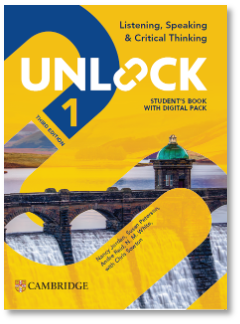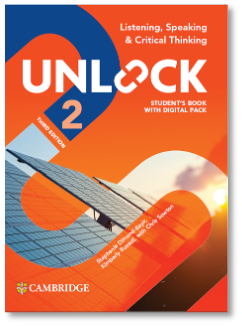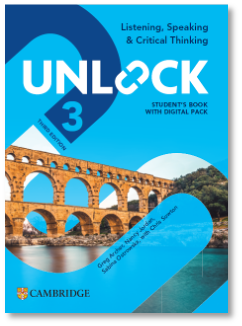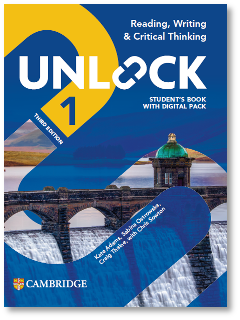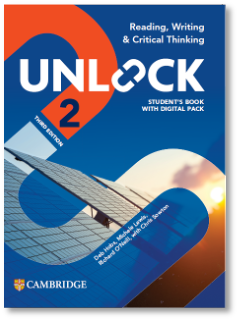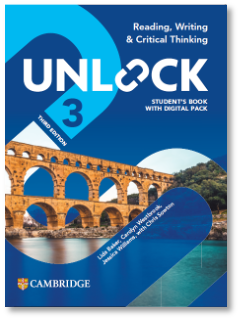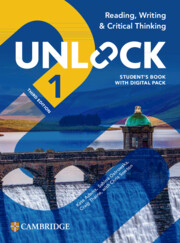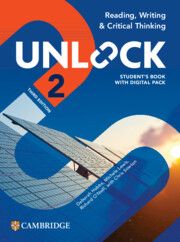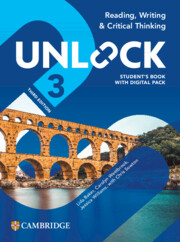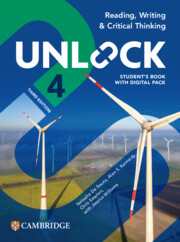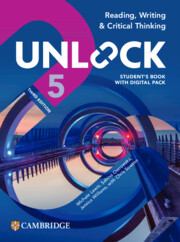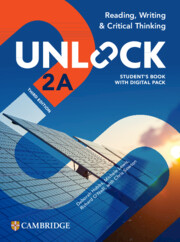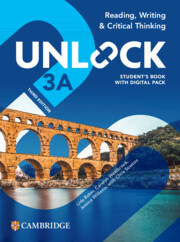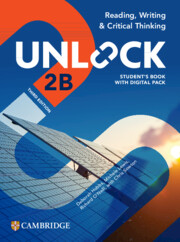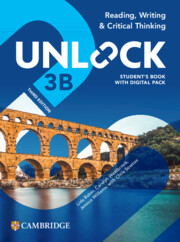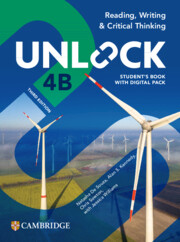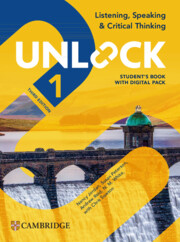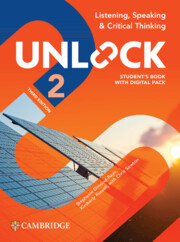Unlock 3rd Edition
Key Features
Informed by up-to-date pedagogical research and our exclusive two billion-word Cambridge English Corpus, the lessons focus on the language areas students find most challenging.
Teaches higher- and lower-order critical thinking skills while measuring progress to develop students’ ability to think critically in an academic context.
Video lessons featuring contemporary topics and content.
What makes Unlock 3rd Edition special?
Unlock 3rd Edition is an academic-light English course created to build the skills and language students need for their studies. It develops students’ ability to think critically in an academic context right from the start of their language learning.
- Two reading or listening passages for each unit. The first passage provides information about the unit topic and practises the skills to process academic texts.
- Writing or speaking skills practice and tasks uses the skills and language learned throughout the unit to support students in preparing/drafting, producing and delivering/editing a piece of academic work. Each section of the book supports students in building up to this final task.
- Word lists at the end of each unit highlight the key vocabulary from the unit. The most frequent words used at this level in an academic context are highlighted.
Unlock 3rd Edition develops students’ ability to think critically in an academic context right from the start of their language learning. Critical thinking is at the heart of Unlock, fostering the skills and strategies students need to tackle academic tasks when gathering and evaluating information, organizing and presenting their ideas, and then reflecting on them.
Critical thinking in Unlock:
- is informed by a range of academic research from Bloom in the 1950s, to Krathwohl and Anderson in the 2000s, to more recent considerations relating to 21st Century Skills
- has a refined syllabus with a better mix of higher- and lower-order critical thinking skills
- is measurable, with objectives and self-evaluation so students can track their critical thinking progress
- is signposted with skill-specific icons so that students know which critical thinking skill they are focusing on and when
- is supported with specific teacher development material on critical thinking in every unit of the all-new Teacher’s Manual and Development Pack so teachers can teach with confidence.
… so students have the confidence to apply the critical thinking skills they have developed in their future studies, giving them the best chance of academic success.
Critical thinking is supported with professional development material for teachers so teachers can teach with confidence.
Unlock is informed by consulting with a global advisory panel and comprehensive review of the material so you can be assured of the quality of every lesson
- Extensive market research with teachers and students helped inform and fully understand their needs throughout the course.
- Consulted academic research into critical thinking
- Uses up-to-date content informed by our Cambridge Academic Corpus, a huge collection of academic written materials providing insights into the English language and how people use it. High-frequency words in the Cambridge Academic Corpus are highlighted with an icon throughout and target vocabulary in academic texts is highlighted to show it in context.
The start of each unit features an engaging and motivating video which generates interest in the topic and develops listening skills.
QR codes allow students to easily access the audio for listening activities in the Listening/Speaking books, and the reading passages in the Reading/Writing books.
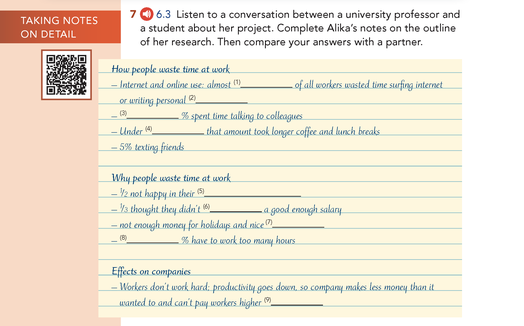
How to find out more
Request free sample
Get an e-sample that will allow you to view a product preview on your desktop.
Free sampleSample content
Join the conversation
Sample content
Sample units are available below for the Listening, Speaking & Critical Thinking and Reading, Writing & Critical Thinking Student's Books.
Listening, Speaking & Critical Thinking
Reading, Writing & Critical Thinking
Student’s Book with Digital Pack
All Student's Book include an activation code on the inside front cover to access the Digital Pack on Cambridge One.
Students’ Digital Pack
- Interactive eBook have embedded audio & video to play at point of use. Some activities in the eBook can be assigned by teachers for students to complete digitally. These activities are automatically marked and recorded in the Gradebook.
- Digital Workbook with videos provides extension activities to further practise the language and stills learned in each unit. Additional comprehension and extension activities for videos (different from the Student’s Book) are included.
- Student's Resources including:
- Downloadable audio of listening activities and pronunciation for Listening/Speaking; audio of all reading passages for Reading/Writing
- Transcripts for audio and videos
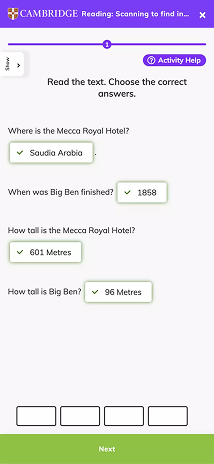
Teachers’ Digital Pack on Cambridge One
Sign up or log in as a teacher on Cambridge One to access the digital material.
- Digital Workbook with videos
- Presentation Plus, a presentation software with audio and videos, available to stream online or download to C1 Desktop App.
- Teacher Resources (Gated – requires access code for Teacher’s Digital Pack)
- Test Package – unit, mid- and end-of-course tests in PDF and Word doc formats; multiple versions available to ensure test security.
- Teacher’s Manual (PDF – one Teacher’s Manual for each Student’s Book) with flexible lesson plans with timings, lesson objectives and lesson observation templates.
- Model Answer Booklet with model and example answers for writing and speaking activities.
- Downloadable audio of listening activities and pronunciation for Listening/Speaking
- audio of all reading passages for Reading/Writing.
- Transcripts for audio and videos
- Common Student Errors
- Consolidation Worksheets for Levels 1-3 (2 per level)
- On Campus Lessons (skills for university life) for Levels 1-3 (2 per level)
- Teacher Development Resources – peer-to-peer training workshops, in-session worksheets and trainer’s notes
Teacher's Digital Pack requires an activation code. Please contact your local Cambridge representative to request a code.
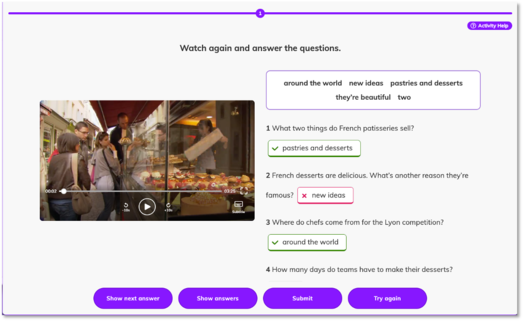
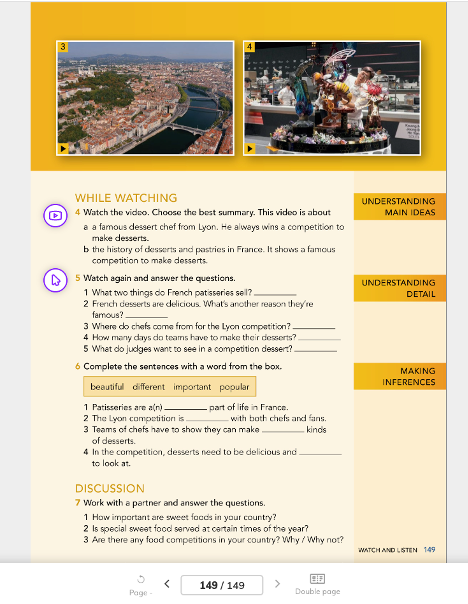
Language Research
Unlock has been developed using the Cambridge Learner Corpus and English Vocabulary Profile. This guarantees that the language presented to your learners in Unlock is both up-to-date and relevant. Using these tools, our authors can see how English is used, identify common mistakes made by learners at a given level, and get additional information on the vocabulary that should be covered at each CEFR level.
This research is unique to Cambridge University Press and gives our authors an insight into language that they can then turn into accurate, effective learning materials.
Cambridge English Corpus
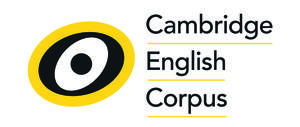
Unique research into academic words and common learner errors (thanks to exclusive access to Cambridge English Corpus) has been used to build the Unlock syllabus. In addition, using the Corpus to specifically analyse common learner errors from Cambridge English exam answers means that your learners’ needs are prioritized and that Unlock focuses on the right academic language for them.
English Vocabulary Profile

The English Vocabulary Profile tells us which words (and which meanings of words), and phrases learners typically know and can use at each level of the CEFR. It provides a complete searchable listing of the words and phrases in English that are considered to be within the levels of the CEFR, forming an invaluable reference for anyone involved in syllabus design as well as materials writers, test developers, teachers and teacher trainers.
To find out more please visit www.englishprofile.org
Critical Thinking
What is Critical Thinking?
Academic success depends on a student’s ability to question statements made by others, make connections, derive knowledge from collected data, make educated judgements, synthesize information from various sources, and deliver insightful presentations. In essence, this requires the development of critical thinking skills which research shows has a positive impact on broader language learning skills; this is especially true for academic contexts.
Critical Thinking Skills: What are they?
Critical thinking is vital for academic success and refers to the kinds of skills learners need to enable them to think effectively and rationally about what they want to do and what they believe is the best course of action. It can involve identifying links between ideas, analyzing points of view, evaluating arguments, supporting evidence, reasoning and drawing conclusions. This thinking draws on Benjamin Bloom’s taxonomy which classifies educational objectives into six categories – knowledge, comprehension, application, analysis, evaluation and creation.
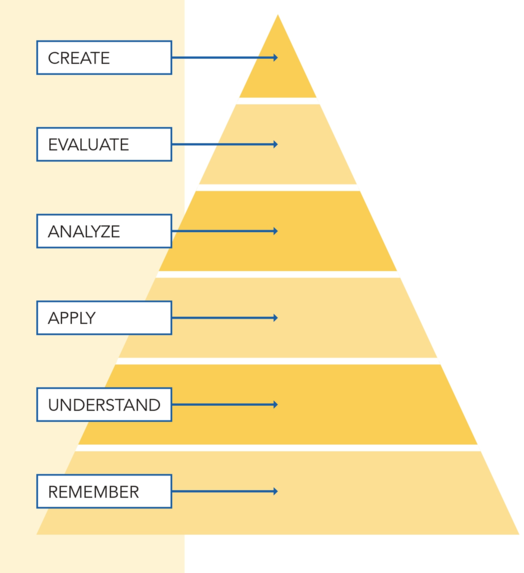
Analysis, evaluation and creation are often referred to as ‘higher-order’ thinking in research on language learning, cognition and educational objectives, taking on board the complexities of the cognitive skills involved (see diagram). Bloom’s taxonomy has been and is still being used by researchers and practitioners worldwide, and, overall, the categories of higher- and ‘lower-order’ thinking have been a useful guide and stimulus to reflect on in teaching material, teaching practice and students’ learning. Importantly, they help us shift from reliance on knowledge, transmission of fact and comprehension to developing learners’ higher-order thinking and problem-solving skills in second language education and learning.
We can see that everyday thinking involves a constant back and forth between lower and higher categories, and there should be a dynamic approach in the classroom in which there are opportunities to develop each type of thinking skill. With critical thinking growing in importance internationally and with its role solidified in higher education, mastering each one is fundamental for academic success and beyond.
Life competencies
Levels 1-5 have been mapped to course to the Cambridge Life Competencies Framework (CLCF), which has been developed to provide clarity on the range of life skills, or 21st century skills, that can be integrated in English language programmes, and how those skills develop across the different stages of education.
Take a look at the Cambridge Life Competencies Framework
Unlock Basic
Unlock Basic has been developed for pre-A1 learners. Unlock Basic Skills combines Listening, Speaking, Reading and Writing to give students well-scaffolded, manageable skills practice.
What makes Unlock Basic Skills special?
- Insights gained from expert teachers ensure the course meets the specific academic needs of your pre-A1 students.
- Our research into over 5 million words students use and need has informed the language taught in Unlock Basic.
- Listening, Speaking, Reading and Writing skills are integrated within academic contexts to provide students with an effective and manageable learning experience.
- Watch and remember lessons in every unit include video and motivate students to recycle and extend the language they’ve learned.
- An introduction to critical thinking skills supports students in speaking and writing as they take their first steps towards academic success. Course audio and video.

What makes Unlock Basic Literacy special?
- Insights gained from expert teachers ensure the course meets the specific literacy needs of your pre-A1 students.
- Our research into over 1 million words Arabic speakers use and need has informed the language taught in Unlock Basic Literacy.
- Provides practice in left-to-right reading and writing, handwriting, sound and spelling, and key words for literacy.
- Develops and builds confidence in literacy as students take their first steps towards academic success.
- Can be used with or without Unlock Basic Skills, in class or for self-study.

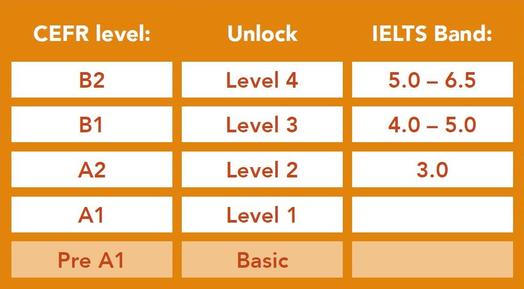
... Unlock Basic. Laying the foundations for academic success.





